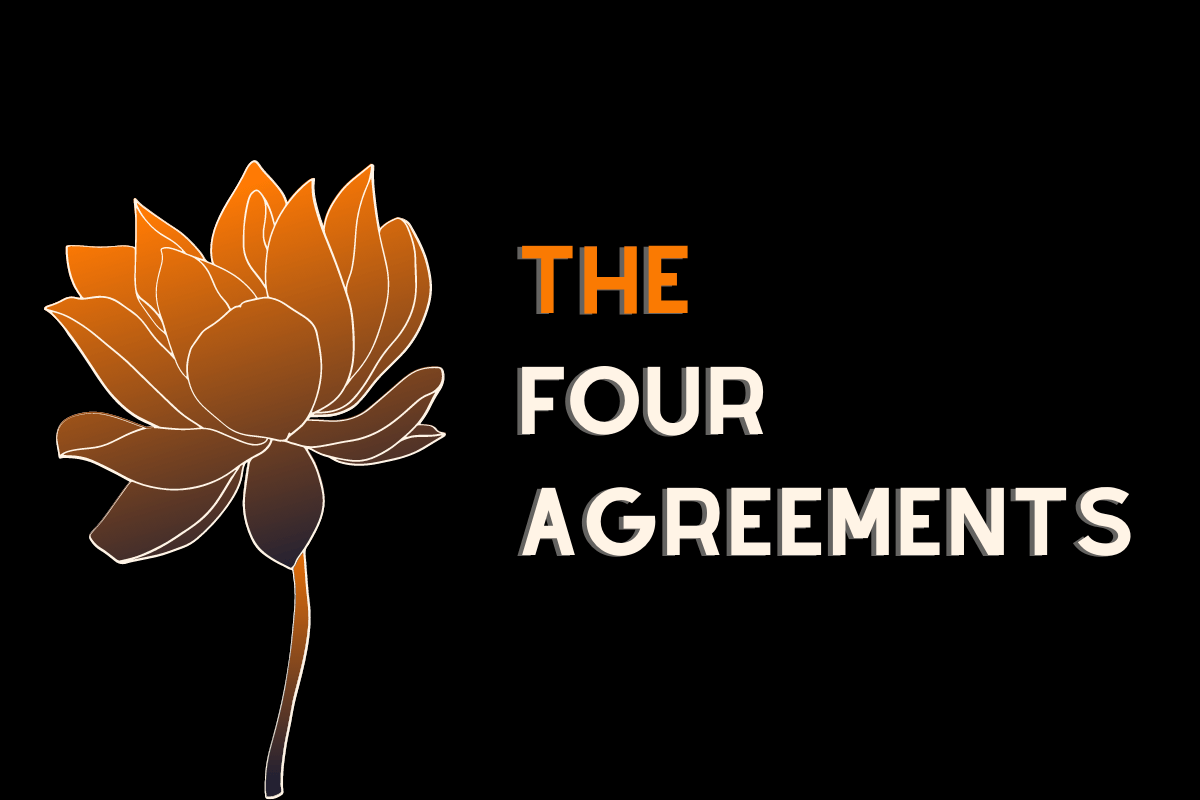Have you ever wanted to literally devour the words in a book, lapping up every phrase and extracting valuable insight at every page turned?
Well, that is what reading The Four Agreements is like… Luckily, this lightweight book provides some heavy life lessons that may allow you to put a different spin on painful memories from your past and to begin living a life focused on real connection and purpose.
The concepts relayed and the rules set out are intended to free us from the negative shackles in our minds that can drive us to act out of fear and provides the tools to change those perceptions into thoughts derived from a mindset based on love.
Love not Fear: a concept stemming from ancient civilizations
In short, “The Four Agreements” is a popular self-help book written by Don Miguel Ruiz that was published in 1997 and has since sold millions of copies worldwide as well as placed on multiple bestseller lists, including for The New York Times. It draws on ancient Toltec wisdom and presents a practical guide to personal freedom and happiness.
The Four Agreements by Don Miguel Ruiz lays out four simple rules to live by in order to approach every situation and relationship with a positive perspective. These guiding principles, or “agreements” when adopted and practiced can lead to radical personal transformation and a much more fulfilling life.
These four rules of life allow one to see things differently and from their best possible standpoint. This, in turn can makes us happier, versus accepting the worst-case scenario as the most likely outcome, potentially causing ourselves unnecessary suffering. It also provides guidelines for us as individuals to do all that we can to ensure that our mindset is guided by the concept of “love” and not “fear”.
The book is widely successful and could be considered the holy grail of personal mastery literature. Its success can be attributed to its accessible writing style, practical advice, and the transformative impact it has had on readers’ lives.
What are The Four Agreements?
The Four Agreements are:
1. Be impeccable with your word
This agreement emphasizes the power of language and the importance of using words in a positive and truthful manner. It encourages individuals to speak with integrity, avoiding gossip, self-deprecating talk, or using words to harm others. By being mindful of our speech, we can create a more harmonious and authentic reality.
2. Don’t take anything personally
This agreement invites readers to recognize that what others say and do is a projection of their own reality, shaped by their beliefs, experiences, and emotions. By not taking things personally, we can free ourselves from unnecessary suffering caused by the opinions and actions of others.
3. Don’t make assumptions
This agreement highlights the dangers of making assumptions and jumping to conclusions about others’ intentions, thoughts, or actions. It encourages individuals to seek clarity and to ask questions rather than assuming and creating unnecessary misunderstandings or conflicts.
4. Always do your best
The fourth agreement encourages individuals to give their best effort in every situation. It acknowledges that “your best” may vary depending on circumstances, but the key is to strive for personal growth and improvement rather than comparing oneself to others. By doing our best, we can avoid self-judgment and regret.
Understanding the Four Agreements: Key principles for personal transformation
In practice, these four rules of life can potentially change how you talk with others, which has a wide area of impact spanning from your thoughts to how you communicate and connect socially with others. Being impeccable with your word, means not only never lashing out or speaking mistruths, but it also refers to speaking more accurately without using exploitative or exaggerated statements and phrases that when broken down are many times not even true.
The rule that states “don’t take anything personally” is not only a gateway to happiness, but it is actually a perspective that is more reflective of the truth inherent in negative events. In other words, most every painful situation that we endure was not necessarily directed at us. This knowledge actually lifts a major portion of the heavy burden allowing us to maintain the energy and positivity to seek out solutions.
“Don’t make assumptions” allows us the freedom to break away from thoughts circulating around others. The truth is, there are many situations that can be perceived from a different light, so to make any assumption is simply a waste of effort. However, if you absolutely must then this rule also means that you can choose to assume the best-case scenario and when doing so sometimes you realize that what you are upset about in fact has no basis in reality.
“Always do your best” is the final of the four agreements by Don Miguel Ruiz and in practice is one of the most liberating and burden lifting. This is because if we always strive to do the best that we can, then we will have nothing to ever feel guilty about.
After reading “The Four Agreements”, like the millions before you, chances are you will begin to make them your way of life. These 4 agreements, which could be considered as core values to live by can serve as the guiding principles to living a meaningful, authentic and happy life.
Happiness Rules!
“The Four Agreements” has resonated with many readers due to its simplicity, practicality, and potential for personal transformation. It offers a framework for examining one’s beliefs and behaviors, challenging societal conditioning, and cultivating healthier relationships with oneself and others. Derived from Toltec wisdom yet applied to our modern-day lifestyles and challenges, Don Miguel Ruiz’s The Four Agreements aims to put an end to the endless suffering we as individuals tend to cause for ourselves.
Somehow, since the Toltec era the concept of choosing to look at situations and people from a place of love and not fear has fallen by the wayside for the newer generations that followed, be it due to scarcity mentality or negative biases or the many other constructs our minds can create. But the truth is, the wisdom in this book proves that the choice of who we want to be and how we want to perceive situations is ours.



